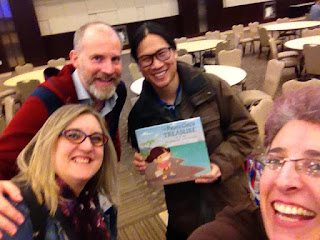I know how intense it is to put on a school musical. Even though I have very few memories of my own time in elementary school, I do recall being actively involved in our school operettas. I was Tinker Bell in Peter Pan, Puss in Puss 'n Boots, and Pinocchio in the play of the same name. Practices and rehearsals were just part of the huge effort behind the production.
 |
| Diana as Pinocchio, circa 1983 |
My role in 2018 with our musical involved photography, creating costumes and makeup for many of the main stage performers and helping the drama club with their mime. Mme Awara also designed costumes, worked with the drama club, and organized the prop and set design club. Additionally, Ms. Clarke and Mr. Roberts (our videographer) made sets too, with and without students. Ms. Wadia was the stage manager, an often thankless, behind-the-scenes job; she and her crew fetched classes so they would appear at the right time quickly and quietly. She and Ms. Daley coordinated the Student Council Me to We bake sale that happened before and after the musical. Ms. Daley also rehearsed with the drama club. So did Mrs. Commisso, who helped make things run smoothly backstage and helped train the Recorder Club. Ms. Lee (and her partner, Mr. McCartney) wrote the play from scratch and composed all the music and songs used. She choreographed the moves by the class groups and with a small team of student helpers, built their props.
I'd say that the musical was a resounding success. The gym was packed and everyone we spoke to afterwards had positive things to say about the event. An endeavor of this scale is always a big nerve-wracking. Somehow, it all came together. The makeup looked better than it did the first time we attempted it. The treats were all sold to eager audience members. I can hardly wait to examine all the photos taken so we can select a few to include in the yearbook.
The very next day, it was Voting Day at our school for the Ontario Library Association Forest of Reading. I tweeted out this photo of our first experiment with an online voting booth / polling station.
Was this an indication of success, or just that I just had a single computer up? Then I looked at my numbers - specifically the ratio between the number of participants that initially signed up and the number of readers that qualified to vote. Last year, I wasn't pleased with my statistics. This year, my Red Maple numbers reached a record high - 95% of the participants who expressed interest initially actually qualified. This is directly related to the efforts of the classroom teachers AND the regulation that students had to qualify to vote to go to the Festival of Trees. My other numbers, which you can see here from past years, were higher for fiction compared to 2015-16, and lower for non-fiction and express when contrasted with that same year. Does that mean my Forest of Reading program was partly a success?
Numbers can be deceiving. As I lamented the low percentages, my colleague Renee Keberer (and beyond-board friend Lisa Noble) gave me a metaphorical kick in the butt - she asked me if I should be sad that not as many qualified, or happy that more students decided to try. Was I so hung up on the quantitative data that I was missing some of the excellent qualitative data? What about that Grade 7 that used to be a uninspired reader, who became so enamoured of the options that he loaned his public library copies out to classmates so they could qualify, and whose passport tribute led to his selection as the sign carrier for the 2018 Red Maple Festival of Trees?
 |
| Forgive the calls to a higher being, but the student was impressed |
What about the Grade 2s and 3s in Room 117 that accepted the challenge even when it wasn't expected of them? What about the students in Room 112, 111 and 113 that worked together to ensure that 50% of their class qualified, thereby giving their class teachers a spot on the Festival of Trees trip? What about D, who told me that he's been at our school since Grade 4 and that THIS was the first year he actually managed to qualify?
So the 2018 Forest of Reading WAS a success at my school. I just needed to reframe, and not get hung up on the numbers. (I can't help it - I'm a data nerd. I kept track of the number of chats I conducted from January to April, and guess how many I did? 320! I know I missed writing some down, but I had 95 in January, 114 in February, 45 in March, and 66 in April.)
I think it's a good idea that I'll be presenting with Kerri Commisso at an upcoming Symposium May 11 for TDSB Learning Coaches with the theme "Measuring What Matters Across the Curriculum". Kerri is an excellent educator and during our most recent collaboration, she did a wonderful job of reminding me that there are different ways to assess success and it isn't always numerical.












